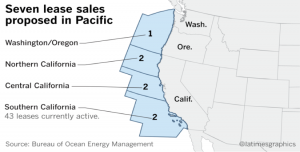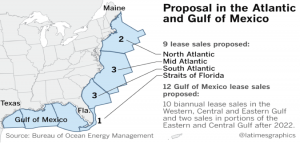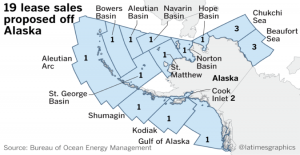Interior Secretary Ryan Zinke announced a draft five-year offshore leasing plan[i] for 2019 to 2024 last week that would commit over 90 percent of the total Outer Continental Shelf (OCS) acreage and over 98 percent of undiscovered, technically recoverable oil and gas resources in federal offshore areas available for future exploration and development. The plan proposes 47 lease sales, compared to the 11 that were made under the Obama Administration. Under the Obama Administration, 94 percent of our OCS was off limits to oil and gas leasing and exploration. The plan proposes seven new leases in the Pacific region, 12 leases for the Gulf of Mexico, 19 for coastal Alaska and nine for the Atlantic—the largest number of lease sales in U.S. history. This plan, as all leasing plans, requires a lengthy process of environmental review and public comment from stakeholders, including local communities.[ii]
Pacific Region
The draft plan would allow the first new federal lease sales off the coast of California since 1984. It includes two lease sales each for Northern, Central and Southern California, as well as one for the area off the Washington and Oregon coast. Currently, there are 43 leases in producing status in the Southern California Planning Area. There are 23 oil platforms located in federal waters off California, four in state waters, and four artificial islands used as drilling platforms off Long Beach and one off Rincon Beach in Ventura County.[iii]
Source: LA Times
Atlantic and Gulf of Mexico
The Interior plan proposes nine lease sales in the Atlantic Region—three sales each for the Mid- and South Atlantic, two for the North Atlantic and one for the Straits of Florida. There have been no lease sales in the Atlantic since 1983 and there are no existing leases.
The plan includes 12 sales in the Gulf of Mexico. It continues the current approach to lease sales in that region by proposing 10 biannual lease sales in the areas of the Western, Central and Eastern Gulf of Mexico that are not subject to congressional moratorium or otherwise unavailable. There are also two lease sales proposed in the portions of the Eastern and Central Gulf of Mexico where there is currently a congressional moratorium that expires in 2022. This is the first time the majority of the Eastern Gulf of Mexico Planning Area would be available for leasing since 1988. The Eastern Gulf of Mexico would probably be attractive to the oil and gas industry because of its proximity to existing infrastructure in the Central and Western Gulf of Mexico that produces about 18 percent of our oil.
Source: LA Times
Alaska
The plan proposes 19 lease sales in the Alaska Region—three in the Chukchi Sea, three in the Beaufort Sea, two in Cook Inlet and one sale each in 11 other program areas in Alaska. These 11 program areas consist of the Gulf of Alaska, Kodiak, Shumagin, Aleutian Arc, St. George Basin, Bowers Basin, Aleutian Basin, Navarin Basin, St. Matthew-Hall, Norton Basin and Hope Basin. No sales are proposed in the North Aleutian Basin Planning Area because it has been under Presidential withdrawal since December 2014.
Source: LA Times
Review Process
The Interior Department will publish a Notice of Intent (NOI) to prepare a Draft Programmatic Environmental Impact Statement (EIS) in accordance with the National Environmental Policy Act. The Interior Department will also hold meetings around the country beginning January 16, 2018, to receive comments. Using the information received from the public meetings, the department will prepare a Proposed Program (PP), which will be published for public comment, to be followed by a Proposed Final Program (PFP). In addition, the department will prepare a Draft Programmatic EIS to be published concurrently with the PP, and a Final EIS with the PFP. The documents will be available for public comment for 60 days following their publication in the Federal Register.
Benefits of Opening Government Lands to Production
In December 2015, the Institute for Energy Research published a study entitled The Economic Effects of Immediately Opening Federal Lands to Oil, Gas, and Coal Leasing, by Dr. Joseph Mason a professor at Louisiana State University and a Senior Fellow at the Wharton School of the University of Pennsylvania. The study assesses the economic benefits of expanding development of oil, gas and coal resources on federal lands. It found that opening the offshore areas of the Atlantic, Pacific and Eastern Gulf to exploration and development would increase GDP by $39 billion annually in the next seven years and $114 billion annually in the next 30 years; it would also create over 172,000 jobs over the next 7 years with 502,000 jobs created over the next 30 years.
The federal government would receive an additional $3.9 trillion in federal tax revenues over 37 years and state and local tax revenues would increase by $1.9 trillion over that period by opening all areas that were unavailable during the Obama Administration, including the Arctic National Wildlife Refuge, to oil, gas and coal leasing.[iv]
Conclusion
The Interior plan for offshore leasing continues on the theme of President Trump’s “energy dominance” program. The proposed plan calls for 47 lease sales to be scheduled in 25 of 26 areas off the United States’ coastlines between 2019 and 2024. By opening the nation’s waters for business, the oil and gas industry will create jobs and provide economic growth, and the government will obtain revenues from taxes, royalties and rents. The plan requires a lengthy process of environmental review and public comment, which will begin next week, so that stakeholders can be heard before a final plan is produced.
[i] Bureau of Ocean Energy Management, 2019-2024 National Outer Continental Shelf Oil and Gas Leasing Draft Proposed Program, January 2018, https://www.boem.gov/NP-Draft-Proposed-Program-2019-2024/
[ii] Press Release, Secretary Zinke Announces Plan For Unleashing America’s Offshore Oil and Gas Potential, January 4, 2018, https://www.doi.gov/pressreleases/secretary-zinke-announces-plan-unleashing-americas-offshore-oil-and-gas-potential
[iii] L.A. Times, California offshore drilling could be expanded for the first time since 1984 under federal leasing proposal, January 4, 2018, http://www.latimes.com/nation/la-na-offshore-drilling-20180104-story.html
[iv] Institute for Energy Research, The Economic Effects of Immediately Opening Federal Lands to Oil, Gas, and Coal Leasing, December 2015, http://instituteforenergyresearch.org/wp-content/uploads/2016/01/IER-Mason-Study.pdf






